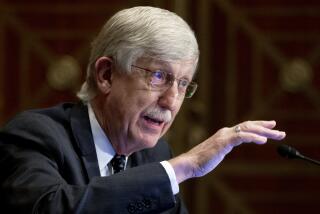$900-Million Anti-AIDS Plan Unveiled
WASHINGTON — Democratic senators, calling on Congress to fill what they termed a leadership vacuum in the Reagan Administration, introduced a $900-million plan Friday to cope with the deadly disease AIDS.
Sen. Edward M. Kennedy (D-Mass.), chief sponsor of the four-point plan, said Administration officials have offered “ideological disputes and paper policies” instead of leadership.
Kennedy, chairman of the Labor and Human Resources Committee, said the measure would expand public education efforts, promote creative care and treatment services and accelerate the search for vaccines and cures for acquired immune deficiency syndrome.
Kennedy said Rep. Henry A. Waxman (D-Los Angeles), chairman of the House Energy and Commerce health subcommittee, would introduce the measure in the House next week. He said they are working on another bill to expand voluntary AIDS testing programs--the fourth part of the plan.
Sens. Christopher J. Dodd (D-Conn.) and Barbara A. Mikulski (D-Md.) are among those co-sponsoring the bill introduced Friday.
The Administration has proposed $100 million for an education program and $365 million for AIDS research, Kennedy said. His $900-million plan would provide $450 million for education, prevention and risk reduction; $100 million to improve care and treatment services, and the rest for research.
Administration health and education officials have publicly disagreed about what type of education drive should be mounted against AIDS and whether testing for the virus should be mandatory.
Kennedy said he expects his committee to report the bill to the Senate floor within a month. Among components of the plan:
--An education, prevention and risk reduction campaign.
--More involvement by community physicians in the care and treatment of AIDS victims, substitution of some hospital care with day care and home care and expansion of mental health support services.
--Streamlined procedures for getting federal funds into research labs and clinics. The National Institutes of Health would have to cut grant approval time to no more than six months, and other executive agencies would have 14 days to respond to requests for AIDS information or material.
More to Read
Get the L.A. Times Politics newsletter
Deeply reported insights into legislation, politics and policy from Sacramento, Washington and beyond. In your inbox three times per week.
You may occasionally receive promotional content from the Los Angeles Times.










